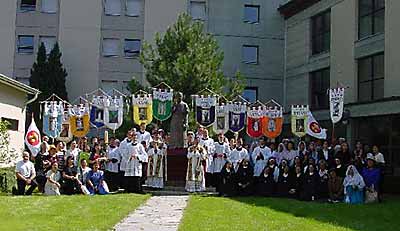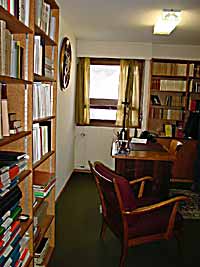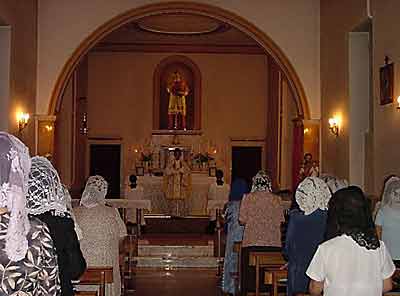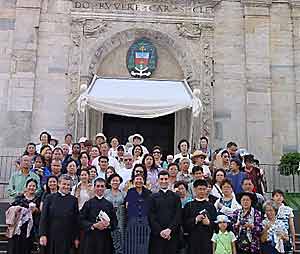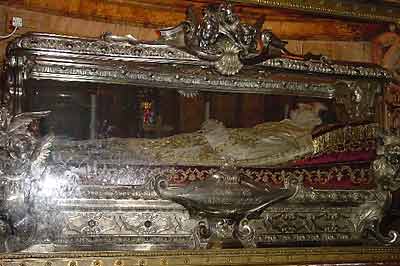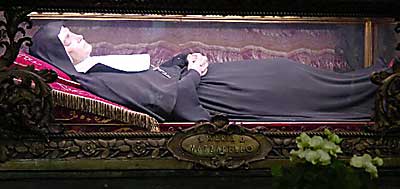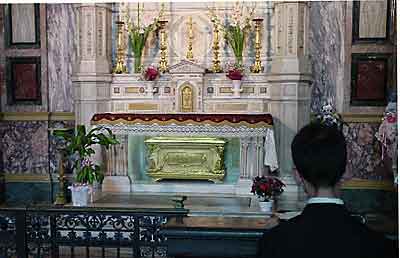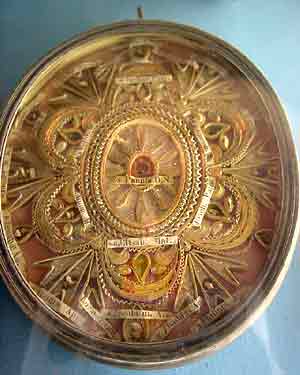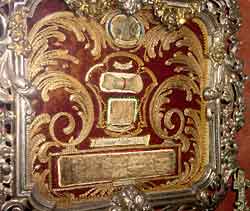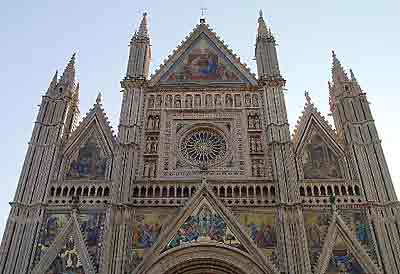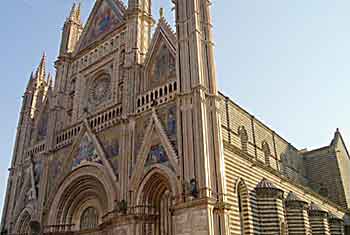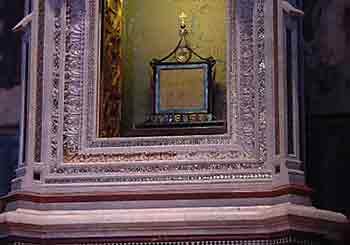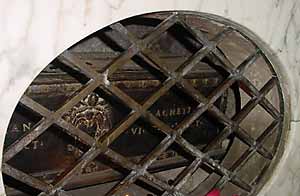

![]()
![]()
|
Newsletter of the District of Asia September-October 2000 SSPX DISTRICT
OF ASIA’S ROME PILGRIMAGE Day 12: Wednesday, August 16, Feast of St. Joachim, Father of the BVMAfter a delicious breakfast we departed for Ecône where we were blessed to have a Solemn High Mass in the new church, thanks to all the clergy that we had with us, and also thanks to the few seminary priests and seminarians, at the seminary during the summer holidays. The music and singing added to the solemnity of the ritual making it wonderfully rich and inspiring. The church was in a different style of architecture, more plain, compared to the ones we had seen in Italy.
At the end of the Holy Mass in Ecône After Mass, we posed for a group picture at the statue of St Pius X, at the exact spot where so many times Archbishop Lefebvre stood with his newly ordained priests and seminarians, over a period of 20 years, and of course with the newly consecrated Bishops, in 1988.
Ecône: office of Archbishop Lefebvre After Mass we visited Archbishop Lefebvre’s tomb and his living quarters. We met again with the Oblates, and exchanged gifts with them. We had lunch on the grounds before leaving for Turin.
The Holy Mass in the Society Chapel in Montalenghe, near Turin, Italy We were welcomed at the SSPX priory in Montalenghe, near Turin, formerly a Salesian house, by Fr. Emmanuel du Chalard. After a visit to the chapel and getting our rooms assigned we enjoyed a wonderful dinner with wine. Our gracious host had prepared a real banquet for our group and our clergy. Of course, we were allowed to help with the dishes and setting of the table for breakfast. Afterwards, there was still time before dark to see on the property one of the oldest Cedar of Lebanon tree in Northern Italy. The seminarian that showed the tree to us had previously thought that he would have had to do all the dishes by himself (for 80 people)! There was also an old mansion on the property that would only cost a few million dollars to repair. So it was locked. Day 13: Thursday, August 17, Feast of St. Hyacinth, ConfessorAfter the Holy Sacrifice of the Mass and breakfast we boarded the buses and were on our way to Turin to view Holy Shroud at 9:00 am. We were shown the way by the prior Fr. du Chalard.
Turin, after venerating the Holy Shroud, happy pilgrims! It is entirely different to see the Holy Shroud in real than to see pictures of it or on a video. The short slide presentation before the actual viewing of the Shroud explained in a very matter-of-fact way exactly what we were about to see. This was done so well that it filled us with a feeling of compassion and sadness at the realization of what Our Lord went through. It is a feeling that is hard to describe. One must see it face to face to understand it. It was of the greatest spiritual benefit for us. We were able to walk right in front of it and pray before it. Then we returned to the church and contemplated it in silence once more for about 20 minutes.
Basilica of Our Lady Help of Christians: The Tomb of St John Bosco
The Tomb of St Maria Mazzarello We then headed for the Basilica of Our Lady, Help of Christians where the incorrupt bodies of St. John Bosco and St. Maria Mazarrela looked like they were only sleeping. The remains of St. Dominic Savio are also in this church.
The tomb of St Dominic Savio In a chapel accessible through a round staircase, on the right, there were literally thousands of relics of Martyrs and Saints of all times. All the walls were covered with reliquaries. I believe in the Communion of Saints!
A
very special reliquary: Pieces of Our Lord's swaddling clothes,
Large relics of St Ann, Mother of the Blessed Virgin Mary We couldn’t stay any longer as we had still a long journey ahead of us. So towards 1.00 pm we left for Orvieto, six hours South of Turin, one hour North of Rome. Day 14: Friday, August 18, Feast of St. Agapitus, Martyr.
The façade of Orvieto Cathedral After breakfast the bus took us to the “funicular” that would lead us up the hill to the old town of Orvieto. What a beautiful façade this cathedral has! It is all done in bright colored mosaics with a lot of gold leaf depicting scenes from the life of Our Lady. The whole history of creation, of the Old and New testaments were also carved in these exquisite relieves, to teach the people. The cathedral is rather very peculiar with its black and white layers of stone used for the walls. It is in the Gothic style, with a very high ceiling.
Orvieto Cathedral, a side view Inside, in the front, on the Gospel side, there is the chapel of the Eucharistic Miracle. It was here that St. Thomas Aquinas wrote his Office for the feast of Corpus Christi with the famous O Salutaris, Tantum Ergo, Adoro Te, etc. Part of the walls and ceiling of the chapel to the right of the main altar was painted by Fra Angelico and showed scenes of the last judgement that were so real! Fr Griego offered the Holy Mass “in the catacombs”, in the crypt of the Basilica. This was a small vaulted chapel where the complete skeleton of saint Evangelisto, the first Apostle of Orvieto, was inside the altar, and visible through a little opening. Tombs of other Saints were on the side. There were no other decorations here. Right above us, in the chapel where the Miraculous Corporal stained with the Precious Blood is venerated, there were Novus Ordo masses said one after the other, complete with guitars....
Orvieto: The Miraculous Corporal Here, in the parking lot, we had to say farewell to part of our group, the Singaporeans, along with Fr. Couture, whose plane was in the afternoon. As a result, the two buses headed back to Rome, through various routes, but met again to visit the catacombs of St. Priscilla. (Reader, do you remember who she is?) Here we saw the oldest and original fresco of the Blessed Mother and Child.
Rome,
Church of St Agnes outside the Walls, We took the bus again and arrived at the church of St. Agnes where we saw her tomb and that of Constantine’s daughter. Near the church there was a gym sheltering many students for the World Youth Week. We ran into a lot of them, part of the 2 million that were arriving from all over the world. We had dinner in town and then went to our hotel, which was the best of them all! Modern and with all the luxury amenities we so enjoy! That night, Father Onoda blessed the objects that we had all purchased. Day 15: Saturday, August 19, Feast of St. John Eudes, Confessor. The Holy Mass celebrated by Fr. Onoda was beautiful. There was a platform for the Mass with two steps up in a carpeted and comfortable conference room. After breakfast, most of the group left for the airport after saying goodbye to many new friends. Some of the Koreans and Japanese stayed behind with Fr Onoda. The trip to the airport went by very fast as we exchanged addresses and sang songs in languages we had not heard two weeks earlier. About 20 hours later, we were back in our respective homes either in the Far West or the Far East. It was a dream come true, to have visited so many places that we had wanted to visit for many years, and to have been part of such historical days in the history of Catholic Tradition, and of the Society of St Pius X. We came home solidly grounded in our love for Rome, and proud to be Roman Catholics. For the two of us, it was truly a special privilege to be included in the Asian Delegation. Deo gratias. |
